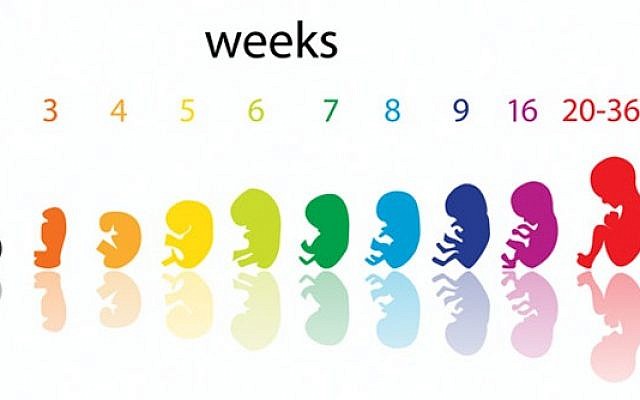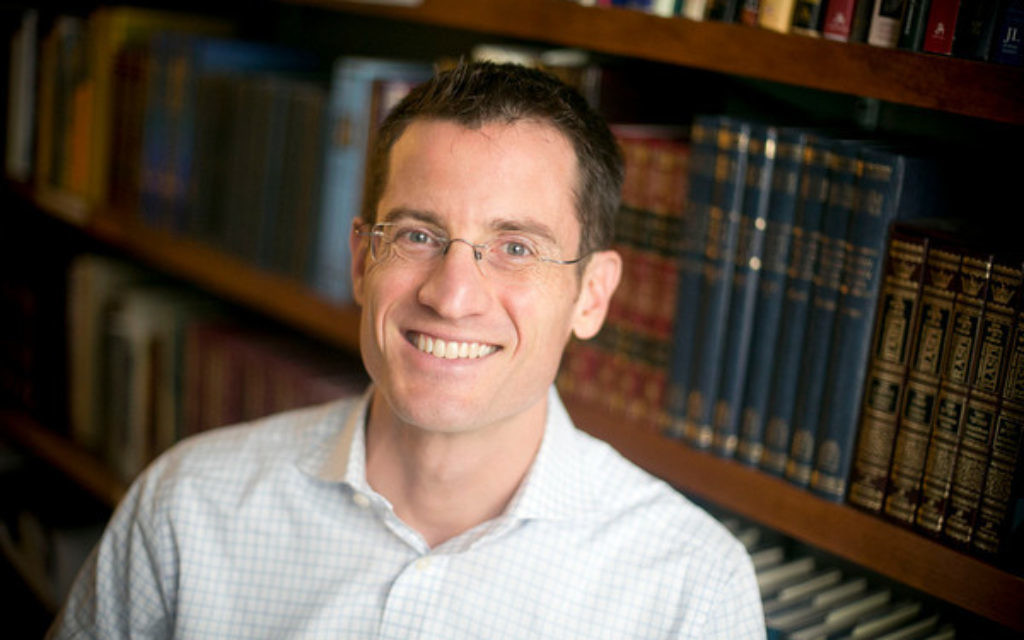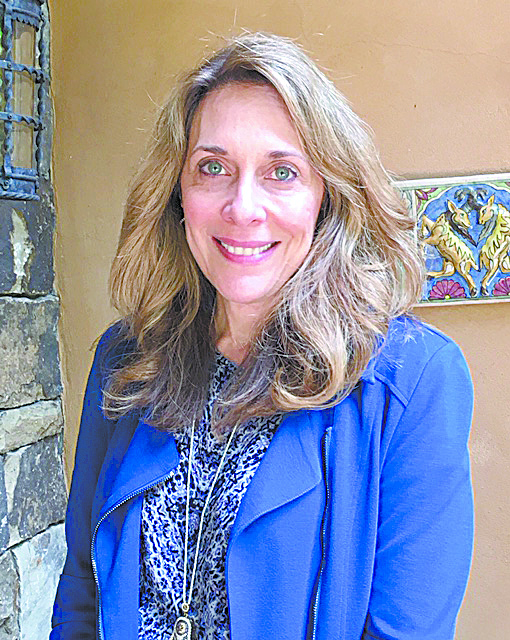Jewish Law and Abortion
Georgia's "Heartbeat Bill" is scheduled to take effect January 2020, hear from local rabbis on how Jewish law is interrupted on the topic of abortion.
Dave Schechter is a veteran journalist whose career includes writing and producing reports from Israel and elsewhere in the Middle East.

Abortion is a “third rail” issue, one so highly charged that it is broached only with caution. The allusion is to the electrified rail on a train line, the one stepped on at the risk of life.
That voltage increased in Georgia on May 7, when Republican Gov. Brian Kemp signed legislation referred to by its supporters as the “heartbeat bill.” The Georgia law, scheduled to take effect January 2020, would ban abortion after a doctor detects a heartbeat, usually around six weeks into pregnancy. Georgia previously banned abortions after 20 weeks.
The new law makes exceptions “to avert the death of the pregnant woman or avert serious risk of substantial and irreversible physical impairment of a major bodily function of the pregnant woman. No such condition shall be deemed to exist if it is based on a diagnosis or claim of a mental or emotional condition of the pregnant woman.” Georgia also would make exceptions if the pregnancy is determined to be “medically futile,” or in cases of rape and/or incest — in the latter instances, if the pregnancy is not beyond 20 weeks and a police report has been filed.
Challenges to Georgia’s law and similar measures passed in other states will face challenges in federal courts, potentially reaching the Supreme Court of the United States. In 1973, SCOTUS ruled in Roe v. Wade that a woman’s right to an abortion was protected by a “right to privacy” under the 14th Amendment of the Constitution. The court said that states could regulate abortion “at approximately the end of the first trimester,” but in a 1992 case replaced that standard with “fetal viability,” defined as the ability to live outside the womb.
Jewish law – halacha, in Hebrew, meaning to walk a path – differs from Georgia law on the issue of personhood and the circumstances under which abortion is permitted, though both make an exception if the life of the mother is endangered.
“Jewish law is not clear or unequivocal as to whether a fetus is ever a person and whether abortion could ever be murder,” according to an article co-authored by Rabbi and Emory University law professor Michael Broyde.

The greater priority is the health and welfare of the mother. “Jewish law sees the fetus during the first 40 days of gestation as ‘simply water’ and during the rest of gestation ‘like the thigh of its mother.’ It does not become a full human being until birth, specifically, until the head emerges from the vaginal canal or, if a breach birth, when ‘the majority of the body’ or the shoulders emerge,” said Rabbi Analia Bortz, co-founder of Congregation Or Hadash. Bortz is also a medical doctor with post-doctorate studies in bioethics.
Jewish law applies the interpretation of ancient texts to present-day circumstances. The new Georgia abortion law cites advances in modern medicine as supporting the state’s right to restrict abortion, even if potentially in conflict with federal law.
Georgia House Bill 481, the “Living Infants Fairness and Equality (LIFE) Act,” reads: “Modern medical science, not available decades ago, demonstrates that early infants in the womb are a class of living, distinct human beings that, among other individual human traits, have their own distinct blood types, distinct organ systems, distinct central nervous systems, unique fingerprints, unique genetic characteristics, and at approximately six weeks gestational age, detectable human heartbeats; from earliest development, unborn children need only nourishment and a safe environment to grow to full adulthood . . .”
Based on that determination, the law states: “It shall be the policy of the State of Georgia to recognize the presence of a fetal heartbeat as the point of ‘fetal viability,’ creating a compelling state interest to protect ‘the independent essence of the second life’ as an ‘object of state protection’ from abortion; and It shall be the policy of the State of Georgia to recognize unborn children as natural persons who qualify for state income tax deductions and state population based determinations.”
Rabbi Jonathan Crane is the Raymond F. Schinazi Scholar of Bioethics and Jewish Thought at Emory University’s Center for Ethics. Crane is also an associate professor of medicine in Emory’s School of Medicine and an associate professor of religion in Emory College.

After 40 days, “the fetus acquires some moral status, like that of a thigh,” Crane said. “This does not mean, however, that it has the same moral status as a full person. For example, were a thigh gangrenous, it can be amputated so to save the life of the person. That is, a (substantial) reason must exist to justify excising it. For thousands of years, Judaism has held the position that if a pregnancy beyond the first trimester threatens the life of the mother, permission is granted to terminate it to save the mother’s life. Even when a fetus is emerging from the birth canal, if its head has not yet crowned and the mother’s life is in danger, it is permissible to excise the baby so to save the mother. Only when it has crowned do mother and baby become moral equivalents. Once the baby is a separate entity it becomes a person.”
Broyde outlined varying perspectives on the personhood issue. “There are really four views. One is that the fetus is a person all the time. The second is that the fetus is a person after 40 days. The third is that the fetus is a person after viability. The fourth is that a fetus is a person at the time of birth,” he said from Israel, where he is a Fulbright Senior Fellow and on sabbatical at Hebrew University in Jerusalem.
Unlike Jewish law, the Georgia statute does not consider psychological and emotional distress experienced by the mother as legitimate reasons to sanction an abortion.
“Modern streams of Judaism take very seriously both the physical and psychical well-being of pregnant women. This is demonstrated by the many resolutions by rabbinic organizations and pieces by Jewish bioethicists that say that rape and incest are legitimate reasons to terminate a pregnancy. Forcing a woman to gestate and give birth to a child begun by rape or incest imposes immeasurable psychical distress. Ensuring a woman’s mental well-being holds true for other pregnancies as well,” Crane said.
Georgia’s rate of maternal mortality ranks at or near the highest in the country. “Jewish law supports saving peoples’ lives. It is well documented that in societies where abortion is criminalized, more women die,” said Dr. Mimi Zieman, an obstetrician-gynecologist, who previously was the director of family planning at the Emory School of Medicine and Grady Memorial Hospital.

“Pregnancy puts a woman’s life at risk. Maternal mortality is a real issue with the risk of death in the U.S. being higher than any other developed country, and has increased by 26 percent in recent years, instead of decreasing, and with the risk being three to four times greater for non-Hispanic black women.”
That is not to say that Judaism gives carte blanche to abortions.
“It should be stressed that termination of a pregnancy is not termination of a person,” Crane said. “The Bible (Exodus 21:22) stipulates that inadvertently causing a miscarriage is not a capital crime; it is neither murder nor tantamount to murder. … Though abortion is not criminalized in Judaism, it is not considered a legitimate method of birth control either.”
Bortz said, “Nevertheless, abortion is generally prohibited, not as an act of murder – for the fetus is not a human being, and murder only applies to human beings – but as an act of self-injury. As Jews, our bodies belong to G-d, not ourselves, and we have a fiduciary responsibility to avoid danger to our bodies and to take positive steps to take care of them.”
The concept in Jewish law of a rodef, a “pursuer” intending to murder another person, dates to back some 2,000 years, to the time of the Sanhedrin, and was the subject of interpretation by the 12th century C.E. Torah scholar and physician Moses Maimonides. As Jewish law does not accord personhood to an unborn child, a fetus that endangers the mother’s life is treated as a rodef, permitting an abortion.
“However, if the mother’s life or health is at stake, then an abortion is required,” Bortz said. “If the woman’s life is at risk, … she may choose not to accept the risk and abort the fetus, who does not have the status of a full human life.”
“Some rabbis would also permit an abortion if the child is going to suffer from a lethal genetic disease or would be otherwise severely malformed,” she said.
Broyde and Rabbi Gidon Rothstein, Rosh Kollel of the Yeshiva University Community Kollel, on Long Island, N.Y., co-authored an article on the relationship between secular and religious law. It was published in a February edition of The Jewish Link, a newspaper serving portions of New York and Connecticut.

“Of course, we recognize an overall Jewish opposition to casual abortion. We do need to care about fetuses, recognize their humanity (potential or realized) and hope for as few unneeded abortions as possible. But we also recognize that the real-world complications, which drive the decision to have an abortion, can range from maternal physical and mental health to terrible fetal illness, or impending fetal death to a host of other factors which halachists themselves would respect as quite possibly justifying an abortion,” Broyde and Rothstein wrote.
When New York state’s abortion law earlier this year was amended to permit greater access to abortions after 24 weeks, the Rabbinical Council of America and Agudath Israel of America, which represent large segments of the Orthodox community, objected to the change, which RCA termed “abortion on demand.” Yet, both RCA and Agudath supported, in RCA’s words, “the part of the law that permits abortion, even at a late stage, when the mother’s life is at risk.” Agudath Israel wrote that it “opposes initiatives that would make abortion unlawful even in situations where termination of pregnancy is mandated by religious law.”
The Pew Research Center’s 2014 religious landscape study found that of 847 Jewish respondents, 83 percent said that abortion should be “legal in all/most cases” and 15 percent said abortion should be “illegal in all/most cases.”
After the governors of Georgia and Alabama signed “heartbeat bill” laws, numerous publications compared those measures with abortion laws in Israel, where the procedure is subsidized or free through the national health system and, as of 2014, at no cost to women ages 18 to 33. A healthy married Israeli woman, age 18 to 40, seeking an abortion, must appear before a review panel, which the Israeli press reports approves more than 90 percent of requests. The reasons under which an abortion may be sought include cases of rape, incest and adultery; if the fetus has a serious mental or physical defect; and not only risks to the mother’s physical health, but also impacts on her mental and emotional well-being. Orthodox anti-abortion organizations in Israel have opposed the relatively liberal laws, except for those cases in which the mother’s life is endangered.



comments